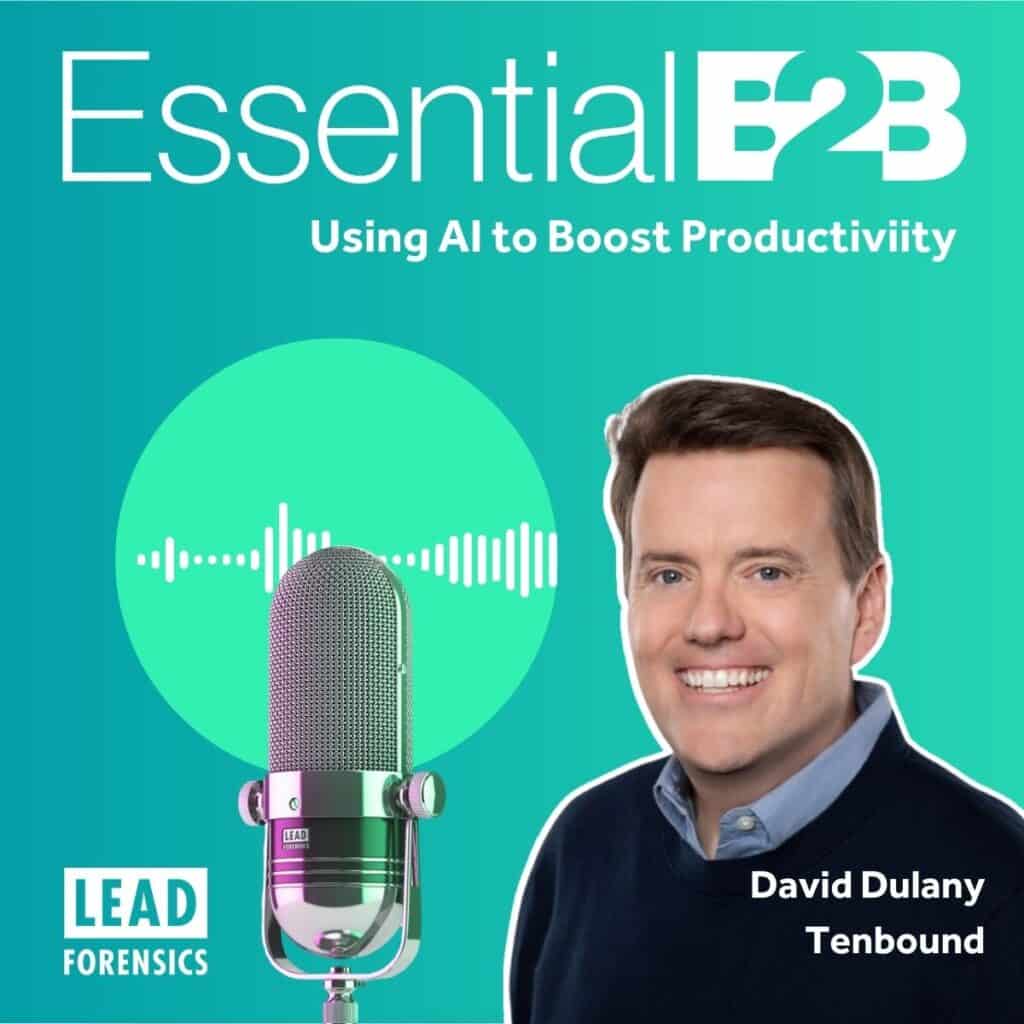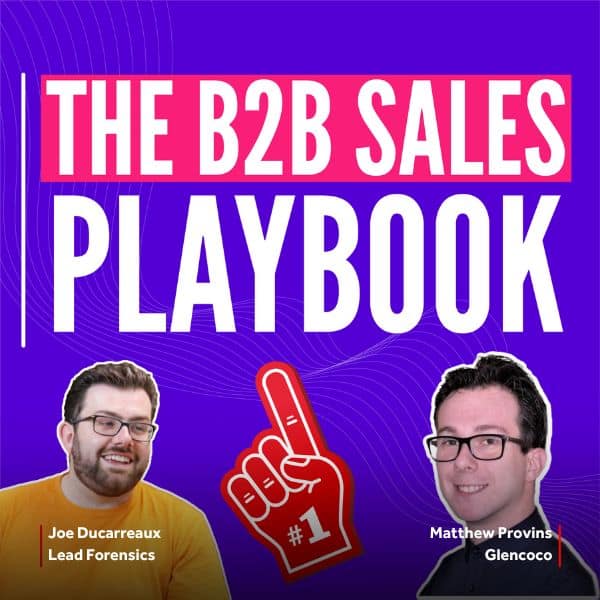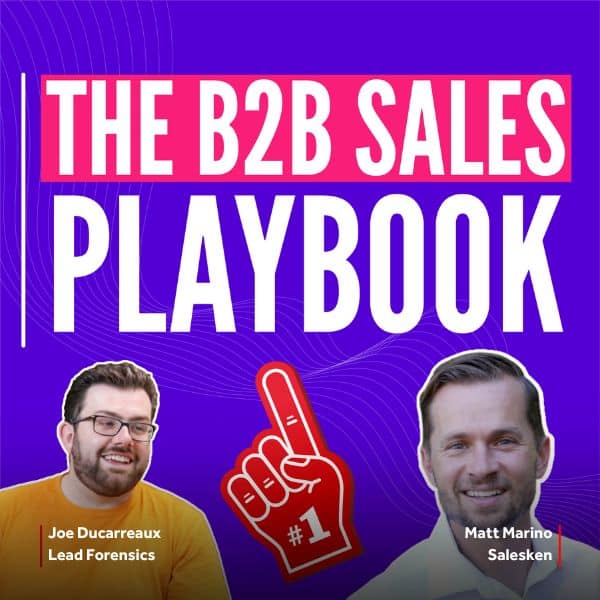The Importance of Goalsetting
This episode features a chat with Global Sales Director at Webeo, Stuart Calver! Stu is a lovely guy with some excellent insight on what makes a great sales leader, but the real takeaway from this conversation with him is on the importance of goalsetting. Stu illustrates how important this concept is to him and how it affects his work and personal life.
Related Podcasts



Transcript
Joe: Hello and welcome to the Essential B2B Podcast brought to you by Lead Forensics. I am your host Joe Ducarreaux. This episode is with Stu Calver, Global Sales Director at Webeo. This is a really great chat. Stu is a lovely chap who really reinforced how important it is to have clear goals set for your career. While we do focus on this in a sales context, you can extrapolate the lessons here to any career so there’s an awful lot to take away from this episode.
So without further ado, please enjoy this episode of the Essential B2B Podcast with Stu Calver.
Joe: What to your mind then are the most important skills needed to succeed in sales?
Stu: The primary one for me is actually around your own, I guess, goals and motivation. Sales is a tough job. You genuinely have to deal with a lot of rejection. A lot of the stuff that as human beings that we don’t necessarily enjoy becomes part of the sales role, in terms of you often don’t get the respect that most normal people get.
For example, you think about people doing SDR roles and stuff, they obviously have to deal with a lot of people being fairly blunt and being ignored quite a lot. I understand why that happens, but you’ve got to be able to really deal with that kind of rejection and that kind of knocking on doors without getting the answers that you want and stuff.
Then even when you get into more face-to-face sales and more of the closing aspect of it, obviously as many people often say no, as say yes. So you’ve got to be able to deal with those factors. So for me in sales, there’s a lot of things but there’s nothing that replaces hard work. As in, you look at all the top salespeople that I’ve ever seen and whilst maybe some of those that are further on in their career might look like they’ve got a really good balance between work and personal.
There’s always a story about how they’ve grinded to kind of get where they are and put in a lot of hours, long hours. The reason why I say all that is that therefore to do all that, if you haven’t got a real goal-driven mindset and a real clear vision of what you want to get and why you’re doing this, all of those things I’ve just described are painful and hard to deal with.
Whereas if you know why you’re doing it and you’re really vividly clear on why you’re doing it and what your end goal is and what you’re trying to achieve, then those other things, whilst they’re not the nicest things to deal with, they’re often just speed bumps. You learn to accept them. That’s like water off a duck’s back. That’s part of the process. Ultimately, I can accept that rejection. I can accept that no. I can accept having to work until midnight tonight because ultimately I know why I’m doing this.
Joe: What would you say is your biggest achievement? It can be professional or personal. What’s your greatest achievement, Stu?
Stu: When my previous company was sold, we had a sales team of about 10 people, but across the years, there were 3 people in the team that delivered 75%, 80% of our sales number every year. The 3 of us were the biggest contributors by a country mile. So we would deliver 75%, 80% of the revenue year in, year out.
When the company was sold, there was quite a big transition in the management team. It was fully expected to have a bit of a drop as a result of that. As it was, in that first year of that new transition, we had our best year ever in sales. So for me personally, that felt like a massive win. I had all the apprehension. I think people often look at leaders and think they’re confident and have no self-doubt and stuff. I had all the apprehension you’d expect of stepping into a Sales Director role for the first time and all of the things I’ve just discussed there. So I think for all of my fears and apprehension when I first made the decision of, yes, I’ll take the role to where we were a year later, that felt big for me.
Joe: Who else inspires you, Stu?
Stu: I’m very sports orientated, I always have been. So I’m inspired by anyone that’s at the top of their profession, just because you know what it takes to be there. So any elite sports person, because I enjoy sports so much, I always find them inspiring.
But I suppose my main inspirations are I try to stay a bit closer to home and people that you actually know, that you understand a bit more about what they really go through. So Paul, who owns our group, I find him very, very inspirational. I’ve never met anyone like him from a goal-setting perspective. I owe him a lot as everything that’s got me to where I am today has been based around goal-setting and being clear on my vision and that came from Paul. So yeah, Paul, from that perspective.
I’m a big believer that everyone does something well and try to look for it. That could be, it doesn’t have to be leaders. There’s people in my team that how they balance their family life and their work life and the amount they put into work, I find that inspirational. It’s something that I’m known to be quite guilty of, is working too many hours and not really finding the right balance there and stuff. And they’re still successful and stuff.
So I think, it might be a bit of a generic answer or a bit of a woolly answer, but I find that rather than just looking at people you don’t know, that you see in the public eye as being inspirational, I’m trying to like look around me and see people that are just living the day-to-day life that we all lead and what are they doing that’s really well. That can be very inspirational when you try and look for what someone’s doing well rather than necessarily what they’re not doing well. It gives you a different perspective of things.
Joe: What motivates you at the start of your day, start of your week? What gets you out of bed every day?
Stu: I turned 40 this year, so a big secret. And it does change your perspective on things. I’ve got a couple of young kids now. Life over the last 10 years has changed quite significantly and you have different focuses. For me now, I’m very focused on what I want my life to look like in 10 years’ time. It revolves around my family, it revolves around the social things that I do that I enjoy. I’m a massive golfer, I love golf and I want to be able to play golf more frequently than I do right now.
You asked about my inspirations. One of my inspirations is my dad and I remember I had a conversation with him back in 2001. So he was in the Navy, and he went into the Navy when he was 17 from Navy college, he trained as an engineer. So he then moved up the ranks fairly quickly through the Navy to a Chief level and he could have gone so much further in the Navy, but he stopped at a Chief level. I said to him, why did you progress so quickly and then stop? And his words were to me, he said, you’ll probably see it as a failure, but for me, I’ve got what I wanted. He knew what he wanted and he was content and I think that’s what everyone in life really wants, is to be content. Because whatever it is that you need to make you content is there for the secret sauce.
So, I guess where I was going with this is that actually my vision for my life is like I’m envious of my dad now, like he plays golf four days a week, I’m like how are you doing that? I’m very lucky, he comes around and does my garden for me because he likes to do a bit of gardening.
I know what I want to achieve and it’s not all big flashy things that it used to be when I was younger. But I know that to have that lifestyle, I need to earn a certain amount of money, I need to achieve certain things and I’m very fortunate in that there’s an opportunity where I’m now working to basically give me the ability to do those things.
So that’s where, for me, that’s my ‘why’. That’s why I get up in the morning, that’s why I go to work, is that I know that the end goal is what I want and this is a vehicle that will help me get there.
So it probably comes back to what I was saying earlier about what I believe is key in sales is knowing your ‘why’, knowing what you’re after. For me, I won’t give you the full details because it’s quite boring, but I’ve got some really clear things that I want to achieve in life and where I want to be and I know what it’s going to take to do that and this is the vehicle that gets me there. And so, yeah, that’s my ‘why’.
Joe: It’s about that clarity of mindset, isn’t it? It’s just imperative for working in sales, I think. So, it was a really lovely story about your dad as well. Just well, I got what I wanted and that was that. So being content with your lot, I think, is what everybody is chasing isn’t it?
So when you can align your personal goals, what you want it to be and align that with what you do on a day to day basis, surely that is contentment. That’s a wonderful answer, Stu. We’ve touched on how you’re a keen golfer, but also you did mention that you’re quite guilty of allowing the work and personal life balance to sort of bleed into each other. What else do you do to decompress from work?
And you know, how important is that divide for you?
Stu: I think the divide is important, but I don’t live by my belief on that one. For me, work never stops. I don’t know, like a lot, especially in the modern world, there’s more and more people sort of saying, now that’s a bad mindset and you need to have that kind of separation. I understand that, it’s just not how I’m wired. Again for me, that kind of cheesy statement of work doesn’t feel like work. It does, don’t get me wrong. If I had freedom of choice, I wouldn’t be doing it. I wouldn’t choose to get up and do the things I do at the moment. I’d probably play golf, I’ve just said that.
But I guess the point of it is, is coming back to the reason I know why I’m doing it, it’s not a chore, because it’s just a stepping stone, if that makes sense. So for me, I’m quite comfortable putting in the grind now in the hope that it brings forward when I get to do the things that I want to do every day. So golf is really important to me. Obviously I enjoy it anyway, but having those four hours out in fresh air without really thinking about too much else. Fortunately I play a nice golf course that’s got amazing views and stuff and it’s good for the soul, if that makes sense. So that’s really important.
The one thing that I have matured with, which I think is, is recognizing when I do need a break. That’s what I didn’t used to do and that’s probably one thing that I’d say to anyone who has a similar approach that I’ve had, which is like, I’m going to do everything I possibly can right now and work all the hours under the sun and stuff. What I have realised… and this is like I say, we’re in the modern world and I’m fortunate in the fact that Webeo’s CEO, she’s very in tune with this type of stuff… is that recognizing when you feel like you’re burning out a bit. So there are times when, as much as I will happily work into the office at 9, 10 o’clock at night, I’ll also have those days where I’m just like, you know what, it’s 4 o’clock, I’m just not getting anywhere here. I’m burnt out. This has been too much. Just go and take some time in the garden with the kids, whatever it might be.
So I think that is something that I have got better with, is recognising when you feel like, you know what, actually as much as I want this right now, I’m not being productive because I’m at burnout. I probably would have in the past almost berated myself for that feeling and just kept on working and be like don’t be lazy, come on you’ve got to do this. Whereas now I’m like, do you know what actually, if I go and take, it might be half an hour out, it might be a couple of hours out, it might be the rest of the day, I know I’ll be better for it tomorrow.
I think that’s probably one of the things that I’ve got better at that I didn’t do 10 years ago.
Joe: Something that does come up on this podcast a lot is when people talk about doing those sorts of activities like running or swimming or yoga or golf or anything. When they then go back to their desk or back to their job, whatever that may be, something has fired in the brain that means that they can look at a challenge or a problem, an issue or whatever with a slightly, almost enhanced perspective and go, okay, well! Now you’ve got rid of the brain fog, if you see what I mean and then it starts to flow again.
Stu, I’ve got one more question for you. This has been a really, really lovely chat. It’s been really nice just getting to hear your answers to these questions. If there was one top tip that you would give to people who are listening to the Essential B2B Podcast, what’s one golden piece of advice you’d like to offer them today?
Stu: Probably the theme of what I spoke about so far today, my piece of advice would be if you aren’t explicitly clear on why you’re doing what you’re doing right now, stop everything you’re doing and become explicitly clear on it. So it makes the day-to-day a hell of a lot easier. You’ll be so much more productive because you’ve then got a sharpened focus on, well actually is this stuff I’m doing right now helping me to get there? Because if it’s not, why am I doing it?
Joe: Stu Calver, thank you so much for joining me on the Essential B2B Podcast today.
Stu: Thanks Joe.


